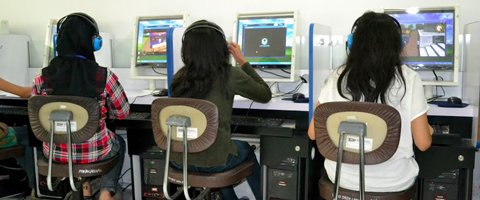
Get ready to play…and learn! On November 15th, people will play games in libraries and classrooms around the world to celebrate International Games Day. This global event emphasizes how games are both fun and beneficial for people of all ages. Use these gaming ideas and resources to help English language learners experience the power of play!
You and your class can participate in the activities below or learn more about International Games Day.
Social Media Activities
- Visit us on Facebook to share your ideas about the value of games in English language education. You'll also find details there about our global “Design Your Own Board Game” contest - don't miss it!
Classroom Activity: “Let's Play!” Learning Stations with Language Games
Activity Level: Lower Intermediate and Above
Activity Overview
Playing games in the English Language classroom provides several benefits to learners: games can increase student motivation, improve teamwork and social skills, and enable students to practice original, creative language while having a great time! To celebrate International Games Day's spirit of learning and fun, you can use resources from Activate: Games for Learning American English to create learning stations with games in your classroom.
While playing a variety of games, students will:
- Listen to and orally practice vocabulary, grammar features, and functional language frameworks.
- Use creative thinking, life experiences, and personal preferences to make original verbal responses during game play.
- Have fun!
See Full Activity
Materials
- A selection of Activate: Games for Learning American English game boards aligned with your students’ level, such as:
- Have You Ever? Oh, When?
- Name Your Favorite
- Which One is Different? Why?
- Name 3
- About Me
You can find all 11 Activate board games here
- Dice or dice alternatives (e.g. pencils with numbers 1-6 written on each side, which can be “rolled” like dice; dice made from paper); you'll need one die per game station. Note: die is the singular form of the noun dice - a good language point to cover with students!
- Game pieces to represent each player's position on the game board. You can use coins, buttons, balls of colored paper or clay, colored paper clips, plastic figurines, unique stones, etc.
- Teacher - whiteboard, chalkboard; markers or chalk; overhead projector (optional); a timing device
About International Game Day
Games come in many shapes and sizes: computer games, video games, board games, trivia games, card games, and games that involve physical movement. What do these types of games have in common? Depending on their rules and content, they can all relieve stress. Games can also sharpen our problem-solving skills, help us devise strategies to achieve goals, and encourage social interaction and communication. Some games deepen our understanding of different cultures, while online and computer games are great for developing digital literacy and multitasking skills. Above all else, games are a fun and motivating way to learn!
Considering these benefits, games can be exciting and effective learning tools in the English language classroom. In honor of International Games Day in November, be sure to give your students opportunities to enjoy “playing to learn.” Also, both teachers and students can share their gaming ideas by entering the American English global “Create Your Own Board Game” contest! Visit our Facebook page for more details.
Let the games begin!
Visit us on AE Facebook to share your ideas about the value of games in English language education!